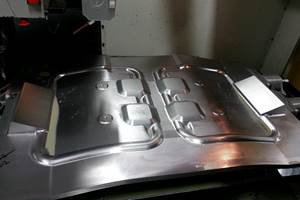On The Web, September 2005
Your Best Search Engine Strategy A common thread that runs amongst all manufacturers with Web sites is that they covet search engine exposure. As a matter of fact, the slightest mention of search engines—how to best optimize a site for them and how to move up higher in their listings—will grab their attention quicker than talk of an open expense account at IMTS.
Share




Your Best Search Engine Strategy
A common thread that runs amongst all manufacturers with Web sites is that they covet search engine exposure. As a matter of fact, the slightest mention of search engines—how to best optimize a site for them and how to move up higher in their listings—will grab their attention quicker than talk of an open expense account at IMTS.
Many manufacturers pursue aggressive search engine strategies. These include search engine optimization (SEO) techniques (such as coding and other tricks within a site's HTML and other pages) and even paying a service to optimize or register with all search engines on the manufacturer's behalf. This is a shame, because those efforts result in few rewards for the amount of work they take and can actually be detrimental to your business.
As for SEO, many companies virtually ignore what their sites actually say and do for visitors, spending inordinate resources on where they stand in search engines. This overemphasis on search engines almost always amounts to: "Hey, I'm going to get more people to visit my Web site more often to find less information about what I actually do!" Brilliant.
Moreover, companies that have others handle their SEO are often misled. Three search engines account for around 90 percent of all searches on the Web—Google, Yahoo and MSN (in that order). Why would anyone care that much about the others? Also, those three engines (especially Google, which is #1 by a large margin) adhere to strict policies that punish sites that try to trick them into higher listings through unseemly practices such as link farming and sandboxing.
Instead of "the tail wagging the dog" through these practices, you're better off concentrating on the actual contents of your own site—talking about what you do, how you do it, what you've done for others and so on. Not only will you serve visitors and your business better by providing something useful, but you'll also be adding the phrases and keywords that your prospects type into search engines.
This quote from Ross Lambert (www.empiricalmarketer.com/blog/) hits the nail on the head: "Really, over time, the best search engine marketing strategy is to create a killer Web site. Wouldn't it be nice if all the energy we direct towards search engine optimization could instead be focused on the quality of our Web site? Google feels the same way, believe me, and the refinements they make to their algorithms are designed to move in that direction. For that reason alone, the quality and focus of your Web site is your best long-term SEO play."
This is not say that sound coding of one's site should be ignored. It's important, but it's not the main thing. Instead of focusing primarily on how search engines see your site, focus on how your customers and prospects view your site. You'll be better off.
OTW Infoletter
Want to get the online metalworking scoop via e-mail from metalworking's preferred information source? Subscribe to MMS' OTW (On The Web) Infoletter at www.mmsonline.com/newsletter/.
Related Content
How to Determine the Currently Active Work Offset Number
Determining the currently active work offset number is practical when the program zero point is changing between workpieces in a production run.
Read MoreCustom Workholding Principles to Live By
Workholding solutions can take on infinite forms and all would be correct to some degree. Follow these tips to help optimize custom workholding solutions.
Read MoreWhat are Harmonics in Milling?
Milling-force harmonics always exist. Understanding the source of milling harmonics and their relationship to vibration can help improve parameter selection.
Read More4 Tips for Staying Profitable in the Face of Change
After more than 40 years in business, this shop has learned how to adapt to stay profitable.
Read MoreRead Next
Setting Up the Building Blocks for a Digital Factory
Woodward Inc. spent over a year developing an API to connect machines to its digital factory. Caron Engineering’s MiConnect has cut most of this process while also granting the shop greater access to machine information.
Read MoreRegistration Now Open for the Precision Machining Technology Show (PMTS) 2025
The precision machining industry’s premier event returns to Cleveland, OH, April 1-3.
Read MoreBuilding Out a Foundation for Student Machinists
Autodesk and Haas have teamed up to produce an introductory course for students that covers the basics of CAD, CAM and CNC while providing them with a portfolio part.
Read More




















.png;maxWidth=300;quality=90)










